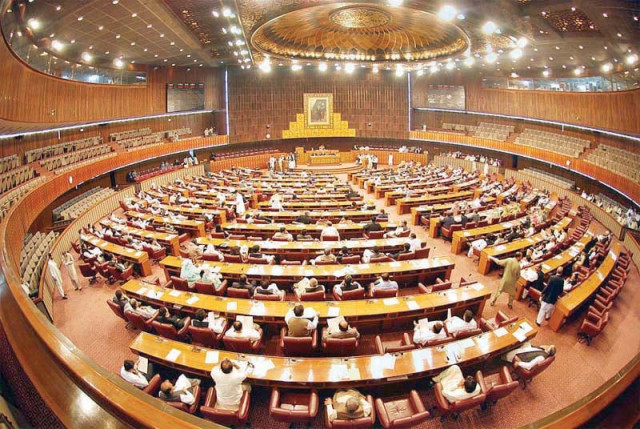Govt tables bill for ‘open vote’ in Senate polls
NA session marred by opposition protest; PM leaves house without taking floor

In a major development, the government on Friday tabled a bill in the National Assembly that seeks to end the use of secret ballots in the Senate elections in order to bring greater transparency to the electoral exercise for the upper house.
On the day when the major opposition parties were busy holding a public rally against alleged rigging in the 2018 polls, the government presented the bill – The Election (Amendment) Act, 2020 – which proposes a larger set of electoral reforms.
“Secret balloting for the Senate elections is an insult to the parliament and undermines party-based democracy,” Imran Khan had tweeted back in February 2015 while his party was in opposition.
On Friday, the government’s strategy to contain the opposition’s October 16 rally by summoning the National Assembly session the same day apparently did not work out as the opposition lawmakers adopted an aggressive strategy and didn’t allow Prime Minister Imran Khan to address the house.
The opposition parties’ protest was so strong that Speaker Asad Qaiser had to stop the session a few minutes after it started and the premier had to leave without making a speech that would have surely targeted the opposition's power show against the government in Gujranwala.
Amid rising political temperature, over a hundred members of the joint opposition had requested the speaker to convene the NA session to discuss arrests of opposition leaders, inflation, circular debt and allegedly collapsing foreign relations in the first week of this month.
The government, however, called the session on the day when the opposition parties were holding their first grand rally under their newly-formed alliance – the Pakistan Democratic Movement (PDM).
Soon after the session started, the opposition lawmakers started shouting slogans against the premier. They also started brandishing banners inscribed with anti-government statements. The opposition’s protest was equally responded by the treasury benches.
This, however, couldn’t go on for long as the speaker announced a 20-minute break. The PM left the assembly amid opposition lawmakers’ hooting and the session was later adjourned till Monday.
The bill proposes to bring a radical change in the electoral process of electing Senate members.
It seeks to discourage horse-trading and manipulation; gives full mandate to the Election Commission of Pakistan (ECP) to facilitate overseas Pakistanis for exercising their right to vote; makes it mandatory to take oath within 60 days and enhances punishment for tampering with ballot paper.
Apart from the main suggestion of holding the Senate elections through an open vote instead of the current method of secret ballot, the PTI government has proposed to insert a new section – 213A (political parties to hold annual conventions).
This section will bind the political parties “to hold regular conventions and submit its report to the commission mentioning therein at least top ten problems of the country, reasons and solutions thereof, in view of the majority members of the party.”
In the past, the Senate elections have often attracted accusations of horse-trading and lack of transparency continues to cast a dark shadow over the upper house. In the recent past, the election for the Senate chairman was marred by controversy when a number of voters had switched across party lines.
In the statement of objectives and reasons, PM’s Adviser on Parliamentary Affairs Babar Awan stated that transparent Senate elections without manipulation and grant of voting rights to the overseas Pakistanis are the long outstanding demands of almost all the political parties, including the PTI.
On January 28, he said, the cabinet constituted a cabinet committee to formulate recommendations regarding electoral reforms in order to ensure transparency, free and fair elections in the country.
Based on the recommendations, he said, the cabinet approved an electoral reforms package consisting of the Constitution (twenty-sixth amendment) Bill, 2020, and the Elections (Amendment) Bill, 2020.
“These bills broadly cover the Senate elections, women and minorities reserved seats, delimitation of constituencies on the basis of enrolled voters instead of population, voting rights to overseas Pakistanis and conditional participation of dual nationals in elections. The bill aims to achieve the objectives.”
Taking the floor, PPP leader Naveed Qamar said the opposition was compelled to take to the streets as the government was not allowing it to speak in parliament. He accused the government of trying to sabotage the opposition’s Friday rally in Gujranwala by summoning the National Assembly session.
Qamar said at the last joint session of parliament, the government did not allow opposition leaders to express their views on legislations with regard to the Financial Action Task Force (FATF) that were bulldozed through parliament.
Later, the speaker referred the bill to the relevant committee. The session will start at 4pm on Monday.
WITH INPUT FROM SAQIB VIRK IN ISLAMABAD



















COMMENTS
Comments are moderated and generally will be posted if they are on-topic and not abusive.
For more information, please see our Comments FAQ